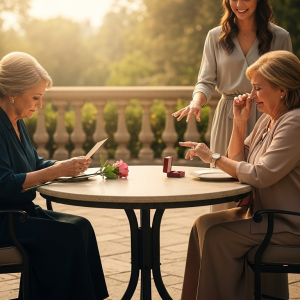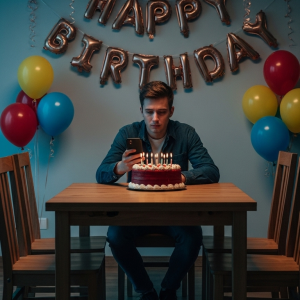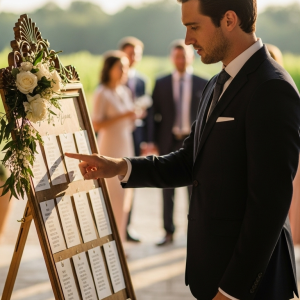The cupcake sat on the kitchen counter, a sad little monument to my own invisibility. It was one of those generic, store-bought types, sweating in its plastic clamshell. Next to it lay a card, the kind you buy in a multipack at a gas station. Inside, in my mother’s rushed script, were four words that may as well have been a slap in the face: ‘Maybe next year.’
This was my twenty-seventh birthday gift.
Three weeks ago, for my younger brother Leo’s twenty-fifth, my parents had rented a sprawling lake house. They’d hired a private chef, curated a guest list of all his friends, and posted a two-minute-long Instagram story set to upbeat music, showcasing their “beautiful boy” living his best life. For me? This cupcake.
I stared at it, not with tears, but with a strange, cold clarity. This wasn’t just an oversight; it was a statement. A confirmation of a truth I had lived with my entire life: in the family solar system, Leo was the sun, and I was a distant, forgotten planet.
My mother walked in then, wiping her hands on a dishtowel. She saw me looking at the ‘gift’ and offered a tight, dismissive smile. “Don’t be so sensitive, Clara. You know how hectic things have been.”
I said nothing. I didn’t argue. I didn’t raise my voice. The quiet ones, we learn to absorb these things. We become experts in swallowing disappointment until it feels like a part of our own anatomy. But this time was different. The quiet didn’t feel like resignation; it felt like the calm before a tectonic shift.
I picked up my phone. Without a word, I opened the camera, framed the pathetic cupcake and the insulting card in a single, stark shot, and pressed the shutter. The click was the only sound in the room. My mother frowned, annoyed by my strange behavior but not yet understanding it.
Then, I walked to my room. I opened my laptop, pulled up an airline website, and booked a one-way flight to Lisbon, leaving in four hours. I packed a single duffel bag. A few changes of clothes, my passport, my laptop. Everything I truly needed.
As I walked out the front door, my mother was on the phone, likely complaining to an aunt about her “overly sensitive” daughter. She didn’t even look up.
The first text from my father arrived just as I was standing at the boarding gate, the hum of the airplane a low promise of escape. It was a single, clueless question that showed just how little they knew me at all.
Dad: Where did you go?
Lisbon was a balm. The city was a vibrant tapestry of colorful tiles, the scent of salt and pastries, and the melancholy sound of Fado music drifting from open doorways. I found a small, sun-drenched apartment overlooking the terracotta rooftops and, for the first time in years, I felt like I could breathe.
For twenty-four hours, I kept my phone on airplane mode. I explored, I ate, I sat at seaside cafés and watched the waves, letting the distance do its work, untangling the knots of resentment in my chest. On the second night, sitting on my balcony with a glass of crisp Vinho Verde, I decided to respond.
I didn’t text them back. I opened Instagram.
My first post was the photo I had taken in the kitchen. The sad cupcake. The dismissive card. I didn’t add an angry caption. I just wrote two words: “Birthday memories.”
I let that sit for an hour, a quiet, cryptic grenade. Then, I posted a second photo. It was a picture of me, taken by a friendly stranger, on a cliff overlooking the Atlantic at sunset. The wind was in my hair, the sky was a blaze of orange and pink, and I was smiling. A real, genuine smile. The caption for that one was simple, too: “Decided ‘next year’ should start now.”
Then, I turned my data back on. The explosion was immediate and predictable. My phone began to vibrate violently, a frantic, buzzing insect. Missed calls from my father. Missed calls from my mother. A string of increasingly frantic texts.
Dad: What is this? Lisbon?? When did you go to Portugal? Mom: Clara, take that picture of the cupcake down RIGHT NOW. You are embarrassing this family. Dad: Your mother is very upset. You need to call us. Mom: Do you have any idea how this makes us look? After everything we do for you? This is how you repay us?
And then, a message from the golden child himself. Leo: Hey, Mom and Dad are freaking out. What’s the big deal? Just come home.
What’s the big deal? He was so insulated by their adoration that he couldn’t even comprehend the slight. The cruelty wasn’t visible to him because he’d never been on the receiving end of it. The lack of empathy was more staggering than the initial insult.
I poured another glass of wine, watching the city lights begin to twinkle below. They weren’t worried about me. They were worried about their image. My quiet act of self-preservation had disrupted their carefully curated narrative of the perfect, loving family. And for that, I had to be punished. My phone rang again. It was my mother. This time, I answered.
“CLARA ELIZABETH, WHAT DO YOU THINK YOU ARE DOING?” she shrieked, forgoing any greeting.
I held the phone away from my ear, taking a calm sip of wine. “I’m having my birthday,” I replied, my voice even.
“By flying to another continent without a word and posting these… these horrible, passive-aggressive photos? You are trying to make us look like monsters!”
“I didn’t have to try very hard,” I said quietly. “I just posted a picture of what you gave me.”
The line went silent for a moment, the fury momentarily checked by the simple truth of my statement. Then she regrouped, her voice shifting to a tone of wounded martyrdom. “You are being so dramatic. We were planning on doing something for you. You know how stressful this month has been with Leo’s party.”
“Oh, I know,” I said. “A lake house, a private chef, all his friends. It looked very stressful. Almost as stressful as buying a single cupcake.”
“That’s not fair!” she snapped. “Your brother needed that! He’s had a tough year, he’s trying to get his new business off the ground. We needed to celebrate him properly!”
And there it was. The justification. His needs versus mine. His were always legitimate, mine were always ‘dramatic.’ “I’ve had a tough year too, Mom,” I said, the years of quiet resentment finally bubbling to the surface. “Where was my lake house when I graduated with honors? Where was my private chef when I got my promotion? I didn’t even get a ‘congratulations’ text. I got a ‘don’t forget to help your brother move’ instead.”
“That’s different, you’ve always been so self-sufficient…” she started.
“No,” I cut her off. “I wasn’t self-sufficient. I was just neglected. There’s a difference.”
Cornered, she finally let the real truth slip out, a detail so cold and transactional it took my breath away. “We needed that party to go well for Leo!” she cried, her voice cracking with frustration. “Mr. Harrington was there! His father’s old business partner! He’s thinking of investing in Leo’s company! We needed to show him that Leo comes from a stable, successful family that supports him!”
I felt a bitter laugh escape my lips. It all clicked into place. My brother’s lavish birthday wasn’t a celebration of him. It was a business transaction. And my quiet, pathetic little birthday was simply the collateral damage. I wasn’t just less important; in the grand scheme of their ambitions for Leo, I didn’t exist at all.
“So, that’s what this was about,” I whispered, more to myself than to her. “You weren’t celebrating your son. You were courting an investor.”
“You don’t understand the pressure—”
“Oh, I understand perfectly now,” I said, my voice suddenly clear and strong. “I understand everything.”
The truth didn’t hurt. It was a clean, sharp blade that cut through years of confusion and self-doubt. It was liberating.
“You need to come home, Clara,” my mother demanded, trying to regain control. “You need to take down those posts and we will figure this out as a family.”
“No,” I said simply. “There’s nothing to figure out. You have your priorities. And now, for the first time, I have mine.”
I ended the call before she could respond. A few minutes later, Leo called. His tone wasn’t apologetic; it was annoyed, as if I were a fussy toddler ruining his game. “Clara, what the hell?” he began. “You’re making Mom and Dad go crazy. Mr. Harrington even called Dad to ask if ‘everything was alright with the family.’ You’re messing things up for me.”
You’re messing things up for me. That was all it ever came down to.
“Listen, Leo,” I said, a profound weariness settling over me. “For twenty-seven years, I have rearranged my feelings, my needs, and my life to make sure nothing was ever messed up for you. I’m done.” “Because of a cupcake? Are you serious?” “No,” I said. “Because I’ve finally realized that to them, you are an investment, and I am a liability. And I’m choosing to no longer be either.”
I wished him luck with his business and hung up the phone. Then I did something I hadn’t done before. I blocked their numbers. All of them.
The silence that followed was vast and beautiful.
I stayed in Portugal for two more weeks. I explored the winding streets of Alfama, ate my weight in pastéis de nata, and read books in sun-drenched squares. I sent postcards not to my family, but to my friends—the family I had chosen.
On what would have been my last day, I sat at a small café overlooking the Tagus River. The sun was setting, painting the water in hues of gold and rose. I thought about the note on the card—‘Maybe next year.’
They were right, in a way. The next year had come. Just not for them.
I ordered a slice of rich chocolate cake and a glass of port. When the waiter brought it, I raised my glass to the empty chair across from me, to the city, to the horizon. A quiet toast, just for me. To finally being the main character in my own story. And for the first time, it felt like a real celebration.
Returning from Lisbon was like stepping into a different world. My apartment, which I had left in a quiet rush of impulse, now felt different. It wasn’t just a place to live; it was a sanctuary, a space I had reclaimed for myself. The air still held the scent of morning coffee and the tranquility of an undisturbed life. For two weeks, I had grown accustomed to that peace, and I was determined to keep it.
After a day of settling back in, I did something I had been putting off. I took a deep breath and unblocked their numbers. Not because I wanted to talk, but because I refused to hide. The trip had taught me that strength wasn’t in avoidance, but in facing things on my own terms. Dozens of old messages and missed call notifications flooded my phone, a digital testament to their panic. I scrolled through them dispassionately—the accusations, the dramatic pleas, the hollow threats. But after that initial barrage, there was silence. No new calls. No new messages.
That silence, in its own way, was more unsettling than the screaming. It stretched for three weeks. I went back to work, saw my friends, and spent weekends with Leo’s family—my real family. Life moved on. Occasionally, I would wonder what was happening in that house, the one that used to define my world. Had they truly accepted my departure, or was this just the quiet before another storm? I suspected the latter. People like my parents never relinquish control easily. They just change tactics.
And then, on a damp Tuesday evening, their new tactic arrived at my front door.
The knock wasn’t the sharp, angry rap of my mother, nor the hesitant tap of my father. It was soft, almost tentative. I looked through the peephole, and my heart gave a lurch.
It was Leo.
He looked nothing like the brother I knew. The confident man in the designer suit, whose smile was always ready for an Instagram post, was gone. In his place was a man who looked tired and defeated. He was wearing a rumpled hoodie and jeans, with dark circles under his eyes that no filter could hide.
A shiver of old anxiety went down my spine, a conditioned reflex honed over years. He needs something. But then, the calm I had found in Lisbon rose to the surface. I opened the door, but not all the way. I blocked the entrance with my body.
“Hello, Leo,” I said, my voice even.
“Clara,” he said, and his own voice was raw. “Can… can I come in? Just for a minute.”
I studied him for a long moment, assessing. He didn’t look like a threat. He looked pathetic. “You have five minutes,” I said, and stepped aside.
He walked in and looked around my apartment, as if he’d never truly seen it before. He didn’t sit. He just stood awkwardly in the middle of my living room, his hands shoved in his pockets.
“So,” I began, crossing my arms. “What is this?”
“I… I need help,” he stammered, avoiding my eyes. “The business… it’s in real trouble.”
I remained silent, letting him continue.
“Mr. Harrington,” he said, finally looking at me. “He pulled out. After you left, he called Dad, asking about the ‘family stability.’ He said he doesn’t invest in messy situations. The bank is calling. They’re going to seize the warehouse if I can’t make the payment at the end of the month.”
He paused, clearly waiting for a reaction from me. Sympathy. Guilt. An offer of help, perhaps. He got none of it.
“And?” I asked calmly.
He blinked, thrown off by my lack of response. “And? Clara, are you listening? Everything is falling apart! Mom and Dad used up their savings to get me started. If I go under, they lose everything.”
“That isn’t my problem anymore, Leo.”
“How can you say that?” he almost yelled, his desperation starting to fray his tired exterior. “This is our family!”
“No,” I said, my voice still calm but sharp as glass. “That is your family. That family decided my birthday was worth less than a business meeting for you. They decided your financial stability was more important than my mental health. Those were their choices.”
“So you won’t help?” he asked, his voice cracking. “Because you’re still mad about a cupcake?”
“It was never just about the cupcake, and you know it,” I said. “And no, I won’t help. I will not co-sign another loan. I will not give you money. I am not cleaning up this mess.”
The desperation in his eyes curdled into something else, something closer to resentment. “I always knew you were jealous of me.”
I almost laughed. “Jealous? Leo, I’m not jealous of you. I pity you. I have spent my entire life watching them turn you into someone who is incapable of standing on his own two feet. They gave you everything except the ability to fail and learn from it. And now, for the first time in your life, you’re facing a consequence, and you don’t know what to do.”
The words seemed to land like physical blows. He stumbled back, slumped onto my sofa, and buried his face in his hands. His shoulders began to shake. For the first time in my life, I saw my brother cry.
“I never even wanted this business,” he said through his sobs, his voice muffled. “It was their idea. It was always their idea. ‘Leo has to be a success,’ ‘Leo has to carry on the family legacy.’ I don’t even know what that legacy is! I just wanted to… I don’t know. Coach a Little League team. Something simple.”
He looked up at me, his eyes red and desperate. “Do you have any idea what it’s like to be the sun, Clara?” he asked, the words tumbling out. “Everyone just expects you to shine, even when you feel like you’re burning out from the inside?”
For a moment, the wall between us crumbled. I didn’t see the golden child anymore. I saw someone else who was trapped, just in a different kind of cage—a gilded one. He was an investment. I was a liability. Neither of us was ever allowed to just be a person. A sudden, painful empathy bloomed in my chest.
I went and sat next to him, leaving a small space between us.
“Then stop shining for them, Leo,” I said softly. “Let it burn out.”
He looked at me, confusion clouding his tear-stained face.
“This business isn’t you,” I continued. “It’s their dream for you. If it fails, their dream fails, not you. Maybe this is your chance to find your own path. Just like I’m doing.”
He didn’t say anything, just sat there, his sobs quieting into shaky silence. He stayed for a few more minutes before he stood, looking just as lost, but with a new flicker of something in his eyes.
“Thanks, Clara,” he whispered, and left.
I closed the door behind him, feeling not triumph, but a sad sort of peace. The confrontation I had always dreaded had come and gone, and it ended not with a battle, but with a weary truth. We were both products of a broken system. I had found my way out by leaving. Perhaps, by facing failure, he would find his own way out, too.
I didn’t know if we’d ever be the family we were supposed to be. Probably not. But for the first time, I felt that maybe, just maybe, someday, we could actually be brother and sister. And that, in a strange way, meant more than any birthday cake.




